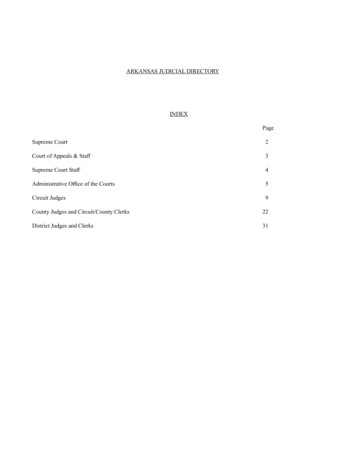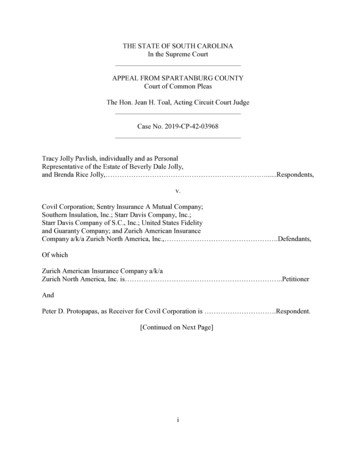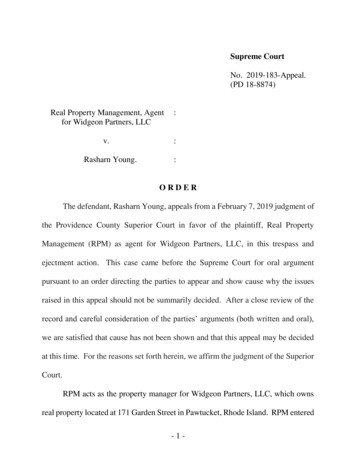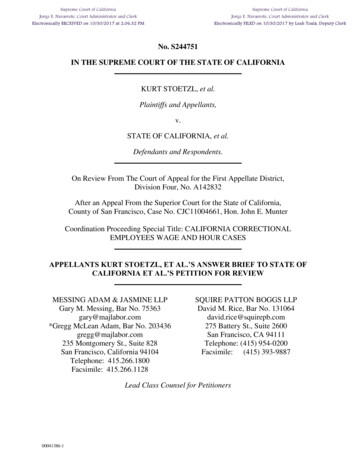
Transcription
No. S244751IN THE SUPREME COURT OF THE STATE OF CALIFORNIAKURT STOETZL, et al.Plaintiffs and Appellants,v.STATE OF CALIFORNIA, et al.Defendants and Respondents.On Review From The Court of Appeal for the First Appellate District,Division Four, No. A142832After an Appeal From the Superior Court for the State of California,County of San Francisco, Case No. CJC11004661, Hon. John E. MunterCoordination Proceeding Special Title: CALIFORNIA CORRECTIONALEMPLOYEES WAGE AND HOUR CASESAPPELLANTS KURT STOETZL, ET AL.’S ANSWER BRIEF TO STATE OFCALIFORNIA ET AL.’S PETITION FOR REVIEWMESSING ADAM & JASMINE LLPGary M. Messing, Bar No. 75363gary@majlabor.com*Gregg McLean Adam, Bar No. 203436gregg@majlabor.com235 Montgomery St., Suite 828San Francisco, California 94104Telephone: 415.266.1800Facsimile: 415.266.1128SQUIRE PATTON BOGGS LLPDavid M. Rice, Bar No. 131064david.rice@squirepb.com275 Battery St., Suite 2600San Francisco, CA 94111Telephone: (415) 954-0200Facsimile: (415) 393-9887Lead Class Counsel for Petitioners00041386-1
TABLE OF CONTENTSPageI.INTRODUCTION . 4II.THE APPLICATION OF THE CALIFORNIA MINIMUMWAGE TO UNREPRESENTED STATE EMPLOYEES ISAN IMPORTANT QUESTION OF STATE LAW . 4III.THE UNREPRESENTED CLASS’S BREACH OFCONTRACT CLAIMS DO NOT WARRANT THISCOURT’S REVIEW . 6IV.CONCLUSION . 1000041386-12
TABLE OF AUTHORITIESPageCASESBetts v. Board of Admin.(1978) 21 Cal.3d 859 . 9Brinker Restaurant Corp. v. Superior Court(2012) 53 Ca1.4th 1004 . 5Industrial Welfare Com. v. Superior Court(1980) 27 Cal.3d 690 . 5Longshore v. County of Ventura(1979) 25 Cal.3d 14 . 7Madera Police Officers Assn. v. City of Madera(1984) 36 Ca1.3d 403 . 4, 7, 8, 9Martinez v. Combs(2010) 49 Ca1.4th 35 . 5Retired Employees Assn. of Orange County, Inc. v. County ofOrange(2011) 52 Cal.4th 1171 . 6, 8, 9White v. Davis(2003) 30 Cal.4th 528 . 7, 9STATUTESCalifornia Code Regs.,tit. 8, § 11040 (Wage Order 4-2001) . 5, 6tit. 8, § 11000 (Order No. MW-2001) . 5RULESCalifornia Rules of Courtrule 8.500(b)(1) . 400041386-13
I.INTRODUCTIONThe Plaintiff Class agrees with the State that the issue of whether theCalifornia minimum wage and the employer control standard applies to theunrepresented class is an important question of state law that warrants thisCourt’s review. (Cal. Rules of Court, rule 8.500(b)(1).)Conversely, the second issue which the State presents for review—whether the unrepresented class needed to “adduc[e] evidence at trial of animplied contract” (State’s Petition For Review (“PFR”) at p. 8)—does notwarrant review. The claims of the Plaintiff Class were based on expresspolicies of the employer, not implied ones. As such, they fell clearly withinthis Court’s ruling in Madera Police Officers Assn. v. City of Madera(1984) 36 Ca1.3d 403.II.THE APPLICATION OF THE CALIFORNIA MINIMUM WAGETO UNREPRESENTED STATE EMPLOYEES IS AN IMPORTANTQUESTION OF STATE LAWThe Plaintiff Class argued at length in its Petition for Review (atpages 6-9 and 14-24) that the question of whether the California minimumwage and the employer control standard applied to rank-and-filecorrectional officers presented an important question of state law. Itfollows that application of the same question to sergeants and lieutenantslikewise presents an important question.00041386-14
The court below, relying on Industrial Welfare Com. v. SuperiorCourt (1980) 27 Cal.3d 690 and Martinez v. Combs (2010) 49 Ca1.4th 35,concluded that the Industrial Welfare Commission (“IWC”) had delegatedlegislative authority to apply the California minimum wages and standardsto “all employees in the state.” (Slip Op. at p. 10, quoting Martinez, 49Cal.4th at p. 57, emphasis in original.) It further concluded that California’sgeneral minimum wage order (Cal. Code Regs., tit. 8, § 11000, Order No.MW-2001) and Wage Order 4-2001 (Cal. Code Regs., tit. 8, § 11040)(“Wage Order 4”) applied to both the represented and unrepresented class“unless superseded.” (Slip Op. at p. 19.) The court ruled that successiveMOUs had “superseded” any possible application of MW-2001 and WageOrder 4 to the represented class. (Id. at pp. 15-17, a ruling the PlaintiffClass urges the Court to review in its Petition For Review.) But the courtrejected the State’s argument that CalHR’s Pay Scales Manual supersededthe wage orders because the manual was not a legislative enactment and“uses language parallel to Wage Order 4.” (Id. at pp. 19-20.)Moreover, the lower court determined “it is possible to harmonizethe California Pay Scale Manual and Wage Order 4, as we must seek to dounder Brinker.” (Id. at p., 20, citing Brinker Restaurant Corp. v. SuperiorCourt (2012) 53 Ca1.4th 1004, 1027.) It explained: “[w]e may reasonablyconstrue the regulatory schemes to mean that entitlement to overtimecompensation is controlled by the FLSA but that the meaning of “hours00041386-15
worked” is governed by Wage Order 4. Such a construction does violenceto neither regulatory scheme.” (Slip Op. at p. 20.)The Plaintiff Class agrees with the lower court’s determination thatthe minimum wage applies to unrepresented employees—but the issue isstill important and it should be reviewed in tandem with whether theminimum wage applies to the represented class. While there are far fewerunrepresented than represented employees (see ts [estimating that approximately 160,000 ofthe total of 200,000 state employees are subject to collective bargaining]),the number of affected state employees is still likely in the tens ofthousands. The unrepresented class of sergeants and lieutenants in this casealone numbers in the thousands.III.THE UNREPRESENTED CLASS’S BREACH OF CONTRACTCLAIMS DO NOT WARRANT THIS COURT’S REVIEWThe State manufactures the second issue it presents. There is no“direct conflict” between the ruling in the court of appeal and RetiredEmployees Assn. of Orange County, Inc. v. County of Orange (2011) 52Cal.4th 1171. The State clearly disagrees with the ruling (just as thePlaintiff Class disagrees with court of appeal’s ruling on the representedemployees’ breach of contract claims), but that in and of itself does notjustify review.00041386-16
The unrepresented employees brought a claim for failure to payovertime in breach of common law contractual obligations based onallegedly uncompensated time they spent at the correctional institutionsunder defendants’ control. (Slip Op. at p. 2.) Plaintiffs relied primarily onthe proposition, drawn directly from Madera that:‘To the extent services are rendered understatutes or ordinances then providing mandatorycompensation for authorized overtime, the rightto compensation vests upon performance of theovertime work, ripens into a contractualobligation of the employer and cannot thereafterbe destroyed or withdrawn without impairingthe employee's contractual right.’ [Citation.]The [meal period] time of the sergeants, officersand dispatchers was work in excess of the eighthour day, and the employees' right to overtimecompensation, mandated by the city regulations,vested upon performance.(Madera, 36 Ca1.3d at pp. 413-414, quoting Longshore v. County ofVentura (1979) 25 Cal.3d 14, 23.) They also relied on White v. Davis(2003) 30 Cal.4th 528, 570-571 (“employees who work during a budgetimpasse obtain a right, protected by the contract clause, to the ultimatepayment of salary that has been earned”).In Madera, the city’s written ordinances and regulations mandatedovertime pay for work performed in excess of the normal eight-hour dayand 40-hour week. (36 Cal.3d at pp. 409-413.) The Court held that theordinances and regulations could be enforced on contractual grounds by00041386-17
employees who had performed services for the city under them. (Id. at pp.413-414.)The contractual claims of the unrepresented employees mirroredthose in Madera. The unrepresented employees established extensiveevidence of written employer policies which entitle them to overtime wagesfor hours worked in excess of their regular schedules. (See 18 AA at pp.5017-5021 [stipulations]; see also RT Vol. III, 545:12-549:16; RT Vol. IV,586:9-587:6, 591:3-592:8 [trial testimony establishing same].)The State implies that Retired Employees, supra, overruled or atleast narrowed Madera. It argues that a public employer’s duly enactedpolicy providing for overtime pay for certain time worked—the touchstoneof the Madera line of case—no longer provides the basis for a contractualright to enforce uncompensated overtime claims. (State’s Pet. at pp. 3538.) But Retired Employees did not overrule or in any way underminedecades of Supreme Court precedent encapsulated in Madera. The holdingin Retired Employees turns on particular standards applicable to vestedretirement benefits, which differ from those controlling overtime pay.Retired Employees arose from a request by the Ninth Circuit Courtof Appeals that the California Supreme Court answer whether, underCalifornia law, an implied contract could confer upon employees vestedrights to health benefits from a public agency. (52 Cal.4th at p. 1176.) The00041386-18
Supreme Court concluded such implied vested rights “can be implied undercertain circumstances from a county ordinance or resolution.” (52 Cal.4that p. 1194.) But it stressed that, due to the “significant” future obligationspotentially created, a “clear showing” must be established that a publicagency intended to create vested pension benefits. (Id. at pp. 1187-1198.)The Court’s concern about establishing future rights arose because vestedpension benefits may only be changed under limited circumstances. (See,e.g., Betts v. Board of Admin. (1978) 21 Cal.3d 859, 863.)In contrast, a public agency’s overtime policies may be freelychanged. Employee rights under them “vest” only in the sense that anemployee is entitled to the pay mandated by the overtime policy thatexisted at the time his or her service was performed. (Madera, 36 Cal.3d atpp. 413-414.) So long as the overtime policies were authorized—notwithstanding whether they arose under a policy, ordinance, statute orcontract— this suffices to create enforceable contract rights. (Id.; White, 30Cal.4th at pp. 570-571. )The State asserts that the unrepresented employees are pursuingclaims based on an implied contract. (State’s PFR at pp. 34-35.) Plaintiffsdisagree. The claims are based on written overtime policies. This mirrorsMadera, in which the claims were based on written overtime policies. (36Cal.3d at p. 413.) It is dissimilar to the claims in Retired Employees, whichwere based on the claim that the county’s prior consistent practice of00041386-19
combining active and retired employees into a single unified pool forpurposes of calculating health insurance premiums (which typicallyreduced the cost of such premiums for retirees) created an implied contractto continue pooling through retirees’ lifetimes. (52 Cal.4th at p. 1177.)The unrepresented employees’ breach of contract claims standseparate and apart from whether the California minimum wage applies.Whether the compensability of the alleged uncompensated time isdetermined by federal or by state law, the parties stipulated thatcompensability of the uncompensated time was to be determined as phase 2of the proceedings, which has not yet occurred. (See 3 AA 579-582.)IV.CONCLUSIONFor the foregoing reasons, as well as those set forth in Petitioners’Petition for Review, the Court should grant review of the question of thewhether the California minimum wage, the employer control standard andLabor Code sections 222 and 223 apply to state employees but should notgrant review of the breach of contract issues.DATED: October 30, 2017MESSING ADAM & JASMINE LLPBy:00041386-110/s/ Gregg McLean AdamGary M. MessingGregg McLean AdamLead Class Counsel for Petitoners
CERTIFICATE OF COMPLIANCE PURSUANT TO CALIFORNIARULES OF COURT RULE 8.504(d)(1)Pursuant to California Rules of Court Rule 8.504(d)(1), I certify thataccording to Microsoft Word the attached brief is proportionally spaced,has a typeface of 13 points and contains 2,208 words.DATED: October 30, 2017MESSING ADAM & JASMINE LLPBy:00041386-111/s/ Gregg McLean AdamGary M. MessingGregg McLean AdamAttorneys for Lead Plaintiffs ClassCounsel
PROOF OF SERVICEKurt Stoetzl et al. v. State of California, et al.California Supreme Court Case No. S244751STATE OF CALIFORNIA, COUNTY OF SAN FRANCISCOAt the time of service, I was over 18 years of age and not a party tothis action. I am employed in the County of San Francisco, State ofCalifornia. My business address is 235 Montgomery St., Suite 828, SanFrancisco, CA 94104.On October 30, 2017, I served true copies of the followingdocument(s) described as APPELLANTS KURT STOETZL, ET AL.’SANSWER BRIEF TO STATE OF CALIFORNIA ET AL.’SPETITION FOR REVIEW on the interested parties in this action asfollows:San Francisco County Superior Court400 McAllister StreetSan Francisco, CA 94102-45151st District Court of Appeal350 McAllister StreetSan Francisco, CA 94102All other parties e-served via California Supreme CourtTrueFiling system.BY MAIL: I enclosed the document(s) in a sealed envelope orpackage addressed to the persons at the addresses listed in the Service Listand placed the envelope for collection and mailing, following our ordinarybusiness practices. I am readily familiar with the practice of MessingAdam & Jasmine LLP for collecting and processing correspondence formailing. On the same day that correspondence is placed for collection andmailing, it is deposited in the ordinary course of business with the UnitedStates Postal Service, in a sealed envelope with postage fully prepaid. I ama resident or employed in the county where the mailing occurred. Theenvelope was placed in the mail at San Francisco, California.00041386-112
PROOF OF SERVICESTATE OF CALIFORNIASupreme Court of CaliforniaSTATE OF CALIFORNIASupreme Court of CaliforniaCase Name: STOETZL v. STATE OF CALIFORNIA, DEPARTMENT OF HUMANRESOURCESCase Number: S244751Lower Court Case Number: A1428321. At the time of service I was at least 18 years of age and not a party to this legal action.2. My email address used to e-serve: gregg@majlabor.com3. I served by email a copy of the following document(s) indicated below:Title(s) of papers e-served:Filing TypeANSWER TO PETITION FOR REVIEWService Recipients:Person ServedDavid TyraKronick Moskovitz Tiedemann & Girard116218David TyraKronick, Moskovitz, Tiedemann & Girard116218Gary GoyetteGoyette and Associates, Inc.224715Gary MessingMessing Adam & Jasmine LLP075363Gregg AdamMessing Adam & Jasmine LLP203436Janine OlikerMessing Adam & Jasmine LLPJoan MarkoffDepartment of Personnel Administration00235874Joan GonsalvesMessing Adam & Jasmine LLPChrisopher ThomasAdditional Service RecipientsDavid RiceAdditional Service RecipientsDavid KingAdditional Service RecipientsDocument TitleSTOETZL ANSWER TO STATE OF CA PETITION FOR REVIEWEmail Addressdtyra@kmtg.comTypeDate / Timee10-30-2017Service 5:06:32 PMdtyra@kmtg.come10-30-2017Service 5:06:32 PMgoyetteg@goyette-assoc.com e10-30-2017Service 5:06:32 PMgary@majlabor.come10-30-2017Service 5:06:32 PMgregg@majlabor.come10-30-2017Service 5:06:32 PMjanine@majlabor.come10-30-2017Service 5:06:32 PMe10-30-2017Service 5:06:32 ng@CalHR.ca.gove10-30-2017Service 5:06:32 PMe10-30-2017Service 5:06:32 PMe10-30-2017Service 5:06:32 PMe10-30-2017Service 5:06:32 PM
Frolan AguilingAdditional Service RecipientsSusana SolanoAdditional Service Recipientsfrolan.aguiling@CalHR.ca.gov e10-30-2017Service 5:06:32 PMssolano@kmtg.come10-30-2017Service 5:06:32 PMThis proof of service was automatically created, submitted and signed on my behalf through my agreements withTrueFiling and its contents are true to the best of my information, knowledge, and belief.I declare under penalty of perjury under the laws of the State of California that the foregoing is true and correct.10-30-2017Date/s/Gregg AdamSignatureAdam, Gregg (203436)Last Name, First Name (PNum)Messing Adam & Jasmine LLPLaw Firm
purposes of calculating health insurance premiums (which typically reduced the cost of such premiums for retirees) created an implied contract to continue pooling through retirees’ lifetimes. (52 Cal.4th at p. 1177.) The unrepresented employees’ breach of contract claims stand separate an
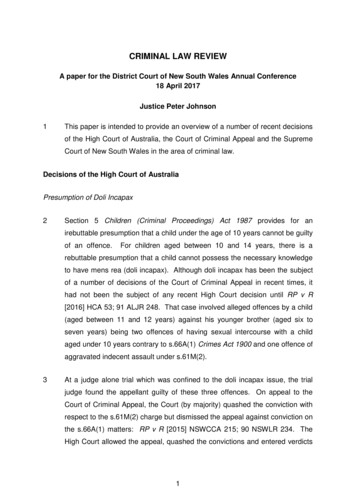
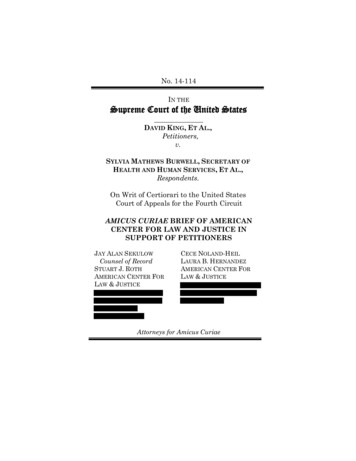
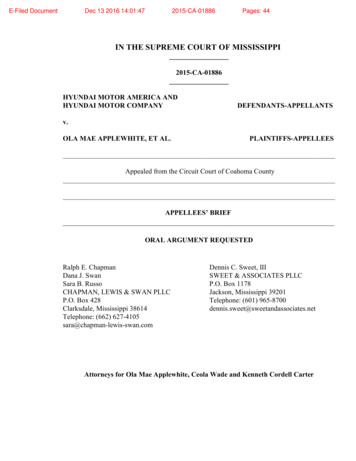
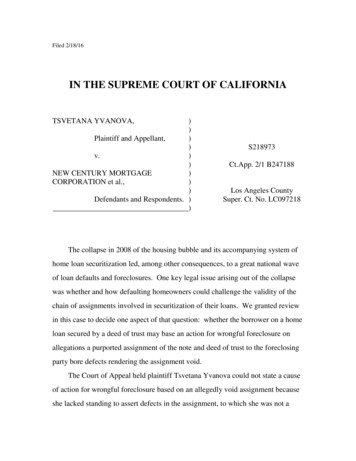
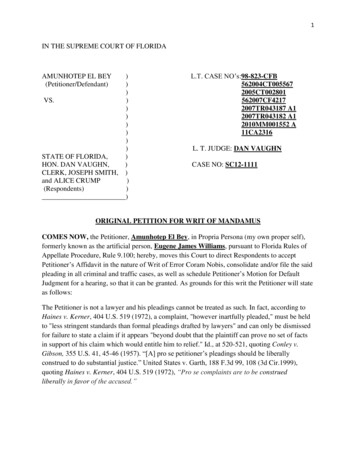
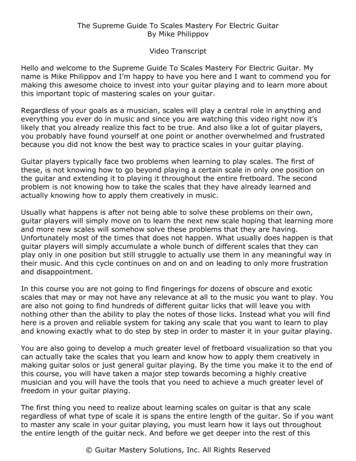
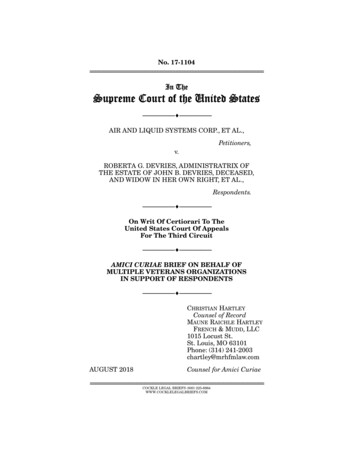
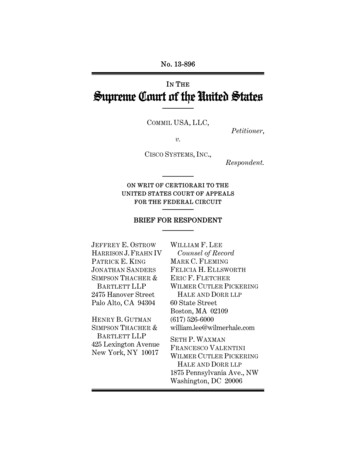
![IN THE SUPREME COURT OF T]-lE STATE OF MONTANA](/img/7/526b198c923f8.jpg)
